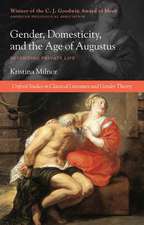The Impact of Gender Quotas
Editat de Susan Franceschet, Mona Lena Krook, Jennifer M. Piscopo Autor Drude Dahlerupen Limba Engleză Paperback – 15 mar 2012
| Toate formatele și edițiile | Preț | Express |
|---|---|---|
| Paperback (1) | 266.29 lei 31-37 zile | |
| Oxford University Press – 15 mar 2012 | 266.29 lei 31-37 zile | |
| Hardback (1) | 427.58 lei 31-37 zile | |
| Oxford University Press – 15 mar 2012 | 427.58 lei 31-37 zile |
Preț: 266.29 lei
Preț vechi: 280.57 lei
-5% Nou
Puncte Express: 399
Preț estimativ în valută:
50.95€ • 55.52$ • 42.94£
50.95€ • 55.52$ • 42.94£
Carte tipărită la comandă
Livrare economică 12-18 aprilie
Preluare comenzi: 021 569.72.76
Specificații
ISBN-13: 9780199830084
ISBN-10: 0199830088
Pagini: 272
Ilustrații: black & white illustrations
Dimensiuni: 156 x 234 x 15 mm
Greutate: 0.39 kg
Editura: Oxford University Press
Colecția OUP USA
Locul publicării:New York, United States
ISBN-10: 0199830088
Pagini: 272
Ilustrații: black & white illustrations
Dimensiuni: 156 x 234 x 15 mm
Greutate: 0.39 kg
Editura: Oxford University Press
Colecția OUP USA
Locul publicării:New York, United States
Recenzii
The editors have united leading experts on quotas and representation in different regions of the world within a superbly crafted common theoretical framework to create an outstanding volume that is both theoretically and substantively enriching. The Impact of Gender Quotas expands our understanding of the effect of electoral gender quotas on descriptive, substantive, and symbolic representation while simultaneously providing an innovative guide for future research in this crucial area of scholarly inquiry.
This impressive edited collection greatly advances the field of electoral quota research. The unmistakable conclusion is that gender quotas will not work to shift the quality of public decision-making towards advancing women's interests unless grounded in two crucial political evolutions. The first is the emergence of a political constituency with the commitment and capacity to hold politicians of whatever gender to account for performance on women's rights. The second is political party leadership willing to make women's participation and gender equality principles non-negotiable in public decision-making. Though sobering, the authors are right. There are two clear paths for realizing women's rights: strengthening women's autonomous organizing, and building the accountability and transparency of decision-making in political parties.
A fine collection EL Highly recommended.
This impressive edited collection greatly advances the field of electoral quota research. The unmistakable conclusion is that gender quotas will not work to shift the quality of public decision-making towards advancing women's interests unless grounded in two crucial political evolutions. The first is the emergence of a political constituency with the commitment and capacity to hold politicians of whatever gender to account for performance on women's rights. The second is political party leadership willing to make women's participation and gender equality principles non-negotiable in public decision-making. Though sobering, the authors are right. There are two clear paths for realizing women's rights: strengthening women's autonomous organizing, and building the accountability and transparency of decision-making in political parties.
A fine collection EL Highly recommended.
Notă biografică
Susan Franceschet is Associate Professor of Political Science at the University of Calgary; Mona Lena Krook is Assistant Professor of Political Science at Washington University in St. Louis; and Jennifer M. Piscopo is Assistant Professor of Public Policy at Salem College.














